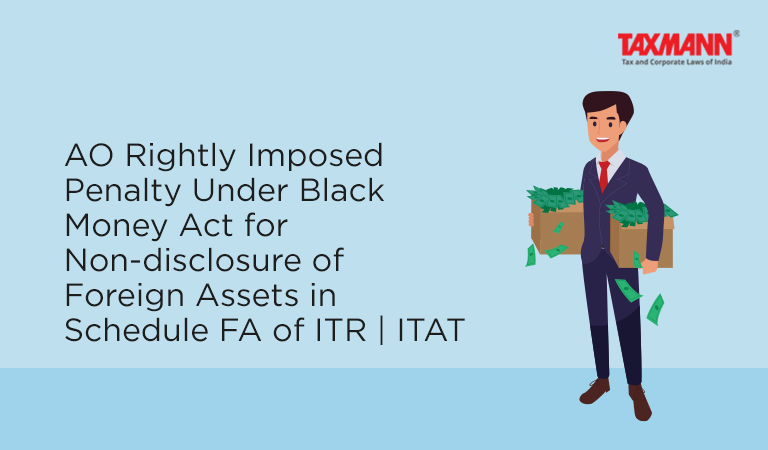AO Rightly Imposed Penalty Under Black Money Act for Non-disclosure of Foreign Assets in Schedule FA of ITR | ITAT
- Blog|News|Income Tax|
- 2 Min Read
- By Taxmann
- |
- Last Updated on 28 September, 2023

Case Details: Ms. Shobha Harish Thawani v. JCIT - [2023] 154 taxmann.com 564 (Mumbai-Trib.)
Judiciary and Counsel Details
-
- Vikas Awasthy, Judicial Member & Ms Padmavathy S, Accountant Member
- B.N. Rao for the Appellant.
- Smt. Prakash Kishinchandani, Sr. AR for the Respondent.
Facts of the Case
Assessee and her husband have made a joint investment in Global Dynamic Opportunity Fund Ltd. Assessee’s share in the said investment was 40%. The assessee invested out of funds transferred from India to HSBC Bank in Jersey.
Assessee declared interest income from the foreign investment in AY 2016-17. Said asset was sold, and capital gain was offered to tax in AY 2019-20. However, the assessee didn’t disclose foreign assets while filing the return of income (ITR) for AY 2016-17 to AY 2018-19 under schedule FA.
Assessing Officer (AO) levied penalty towards the non-disclosure under section 43 of the Black Money Act 2015 (BMA) for each of the assessment years. On appeal, the CIT(A) upheld the levy of penalty. The aggrieved assessee filed the instant appeal before the Tribunal.
ITAT Held
The Mumbai Tribunal held that section 43 of the BMA contains provisions for the levy of penalty for failure to furnish information or furnish inaccurate particulars about an asset (including financial interest in any entity) located outside India in ITR.
As per said section, a resident and ordinarily resident person is liable for a penalty if he fails to furnish or files inaccurate particulars of investment outside India while filing the return of income under section 139. The disclosure of foreign investments/assets is to be made in ITR Schedule FA.
It is apparent from the language of section 43 that the disclosure requirement is not only for the undisclosed asset but any asset held by the assessee as a beneficial owner or otherwise. Undisputedly, the assessee had not disclosed the foreign asset in the return of income – Schedule FA. Thus, the penalty was rightly levied upon the assessee.
The assessee contended that the levy of penalty is not mandatory but is at the discretion of the AO since the word used in the section is that the AO “may” levy penalty.
It was held that even if it is assumed that in the light of the expression “may” used in section 43 of BMA, the AO has the discretion to levy penalty. The assessee failed to substantiate that the AO has exercised his discretion extravagantly.
After examining the facts of the case, AO formed his opinion to levy penalty. He exercised his discretion judiciously. No material was brought to show that AO levied penalty arbitrarily and unjustifiedly.
Further, the provisions of section 43 do not provide any room not to levy penalty even if the foreign asset is disclosed in books since the penalty is levied only towards non-disclosure of foreign assets in schedule FA.
Disclaimer: The content/information published on the website is only for general information of the user and shall not be construed as legal advice. While the Taxmann has exercised reasonable efforts to ensure the veracity of information/content published, Taxmann shall be under no liability in any manner whatsoever for incorrect information, if any.

Taxmann Publications has a dedicated in-house Research & Editorial Team. This team consists of a team of Chartered Accountants, Company Secretaries, and Lawyers. This team works under the guidance and supervision of editor-in-chief Mr Rakesh Bhargava.
The Research and Editorial Team is responsible for developing reliable and accurate content for the readers. The team follows the six-sigma approach to achieve the benchmark of zero error in its publications and research platforms. The team ensures that the following publication guidelines are thoroughly followed while developing the content:
- The statutory material is obtained only from the authorized and reliable sources
- All the latest developments in the judicial and legislative fields are covered
- Prepare the analytical write-ups on current, controversial, and important issues to help the readers to understand the concept and its implications
- Every content published by Taxmann is complete, accurate and lucid
- All evidence-based statements are supported with proper reference to Section, Circular No., Notification No. or citations
- The golden rules of grammar, style and consistency are thoroughly followed
- Font and size that’s easy to read and remain consistent across all imprint and digital publications are applied



 CA | CS | CMA
CA | CS | CMA
